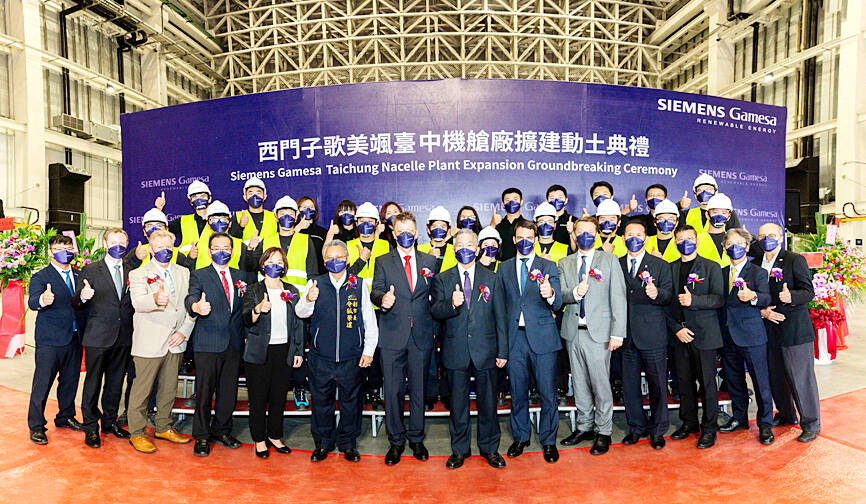Wind turbine manufacturer Siemens Gamesa Renewable Energy SA on Wednesday broke ground on an expansion of its nacelle assembly plant at the Port of Taichung, which is expected to more than triple the number of the company’s local employees, it said in a statement.
“We are thrilled to triple our activities in Taichung and to be leading the Taiwanese offshore revolution,” Marc Becker, CEO of Siemens Gamesa’s offshore business, said in the statement.
The company aims to make the Taichung plant “the centerpiece of our Asia-Pacific offshore manufacturing activities,” Becker added.

Photo courtesy of Siemens Gemesa Renewable Energy SA
The Siemens Gamesa nacelle plant launched in Taichung last year is the largest production facility of its kind in Taiwan, with the first locally made nacelles being provided to Orsted A/S’ 900 megawatt Greater Changhua 1 and 2a offshore wind farms projects.
The expansion is expected to boost the plant’s annual production capacity to 2 gigawatts, with the addition of two new production halls and a new warehouse, the company said.
The new facilities are to have dedicated production lines for hub assembly, nacelle backend assembly and final nacelle assembly, including generator-related work, it said.
Siemens Gamesa said it plans to start assembly of its latest SG 14-222 DD nacelles at the Taichung plant in the second quarter of 2024, and open up opportunities for a vast range of Taiwanese suppliers to feed more than 10,000 components needed for the new nacelles.
With a larger capacity, the plant is intended to deliver locally made nacelles for the 1.044 gigawatt Hai Long offshore wind power project, future projects from the government’s stage 3 offshore wind farm development plan, and other projects in the Asia-Pacific region, the company said.
“With the factory expansion, we are looking forward to leveraging this local footprint together with the Taiwanese supply chain, building a regional offshore wind manufacturing powerhouse based in Taiwan,” Siemens Gamesa Offshore for Asia-Pacific general manager Niels Steenberg said in the statement.
Siemens Gamesa is scheduled to send its first batch of Taiwanese employees for training in Europe beginning next month, it said.
Training involves three months at Siemens Gamesa’s offshore wind turbine factory in Brande, Denmark, and next year they are to receive on-the-job training alongside nacelle assembly colleagues in Cuxhaven, Germany, it said.

Intel Corp chief executive officer Lip-Bu Tan (陳立武) is expected to meet with Taiwanese suppliers next month in conjunction with the opening of the Computex Taipei trade show, supply chain sources said on Monday. The visit, the first for Tan to Taiwan since assuming his new post last month, would be aimed at enhancing Intel’s ties with suppliers in Taiwan as he attempts to help turn around the struggling US chipmaker, the sources said. Tan is to hold a banquet to celebrate Intel’s 40-year presence in Taiwan before Computex opens on May 20 and invite dozens of Taiwanese suppliers to exchange views

Application-specific integrated circuit designer Faraday Technology Corp (智原) yesterday said that although revenue this quarter would decline 30 percent from last quarter, it retained its full-year forecast of revenue growth of 100 percent. The company attributed the quarterly drop to a slowdown in customers’ production of chips using Faraday’s advanced packaging technology. The company is still confident about its revenue growth this year, given its strong “design-win” — or the projects it won to help customers design their chips, Faraday president Steve Wang (王國雍) told an online earnings conference. “The design-win this year is better than we expected. We believe we will win

Chizuko Kimura has become the first female sushi chef in the world to win a Michelin star, fulfilling a promise she made to her dying husband to continue his legacy. The 54-year-old Japanese chef regained the Michelin star her late husband, Shunei Kimura, won three years ago for their Sushi Shunei restaurant in Paris. For Shunei Kimura, the star was a dream come true. However, the joy was short-lived. He died from cancer just three months later in June 2022. He was 65. The following year, the restaurant in the heart of Montmartre lost its star rating. Chizuko Kimura insisted that the new star is still down

While China’s leaders use their economic and political might to fight US President Donald Trump’s trade war “to the end,” its army of social media soldiers are embarking on a more humorous campaign online. Trump’s tariff blitz has seen Washington and Beijing impose eye-watering duties on imports from the other, fanning a standoff between the economic superpowers that has sparked global recession fears and sent markets into a tailspin. Trump says his policy is a response to years of being “ripped off” by other countries and aims to bring manufacturing to the US, forcing companies to employ US workers. However, China’s online warriors